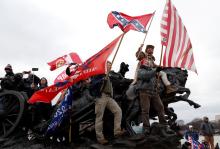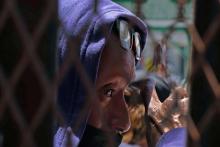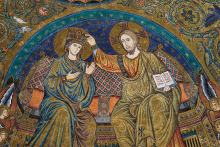Opinion

Passion made it clear that their plan to combat COVID-19 was to do the bare minimum: They did not require social distancing, proof of vaccination, nor testing; per the venue’s guidelines, masks were not required unless the stadium’s roof was closed. They farmed out any safety protocols to others and emphasized that their goal was for the in-person gathering to not be interrupted.

In the new apocalyptic movie, religious expression reveals what really matters to people when the world is ending. As a planet-killing comet comes hurtling toward Earth, some characters, like Kate Dibiasky (Jennifer Lawrence), a Ph.D candidate studying astronomy at Michigan State, and her professor, Randall Mindy (Leonardo DiCaprio) take action; others turn toward denial. But all of them, at some point in the movie, pray. How they pray on their final days on Earth says a lot about what they value.

Remember the sobering images of the U.S. Capitol building attacked and overrun by rioters and insurrectionists; those images can feel unfathomable unless we remember the breadth and depth of racialized violence in our nation’s history. History is about both the what and the why. Given the volumes of footage and visible evidence, it is difficult to refute what happened on Jan. 6, 2021. The deeper struggle will be understanding why it happened.

Jan. 6: The Feast of the Epiphany. The day that marks the revelation of God’s incarnation in Jesus Christ. It was an important day in my family growing up. On “King’s Day,'' in Puerto Rican custom, children would go to the fields and pick grass to leave under their beds. By the next morning, the “Magi” would have already visited — leaving presents in lieu of grass, their camels well-fed from the grass for their journey to the next house.

Supervised consumption sites are controversial in the United States. Why? I believe opposition to them is rooted in mistaken Christian moral assumptions in regard to drugs — and the people who use them.

In one America, an insurrectionist is granted permission by a judge to take a trip to Mexico with charges pending. In the other America, the National Guard is deployed in response to Black Lives Matter protesters organizing at the Lincoln Memorial. One group’s humanity is seen and validated, while the other group’s humanity is ignored and questioned.

“We are hungry for renewal,” Valarie Kaur wrote in the January 2021 issue of Sojourners. “Sound government is necessary but not sufficient to heal and transition America. Only we the people can bring our communities together, tend to our wounds, and do the labor of reckoning, reimagining, and remaking our nation, block by block, heart to heart.”

While this prayer may sound overly sentimental in the face of great peril and challenge, love has the power to cast out fear and undergirds the very pursuit of justice and peace. Rev. Martin Luther King Jr. said, “Power without love is reckless and abusive, and love without power is sentimental and anemic. Power at its best is love implementing the demands of justice, and justice at its best is power correcting everything that stands against love.”

Despite the discomfort some viewers might feel from the film’s visceral violence, Nightmare Alley is ultimately an old-fashioned morality tale, one in which del Toro refuses to let his central character escape the weight and judgment of his own actions. The film barrels towards the moment when Stan’s schemes fall apart with unrelenting brutality, and eventually Stan’s machinations begin to unravel. Nightmare Alley also thrills in the strong performances of characters: Cate Blanchett’s Dr. Lilith Ritter, cool and unflappable, always in control even when she seems not to be; Toni Collette’s Zeena, whose love is more complex than it initially appears.

Spider-Man: No Way Home is the end of a lot of things. It's the end of the (first) Marvel Cinematic Universe Spider-Man trilogy. It’s the end of a lot of speculation about how the multiverse will play into the MCU’s future (since the Loki TV show broke it open). But it also signals the end of the MCU’s innocence — and by extension, superhero movies in general. Spider-Man: No Way Home insists that true heroism looks markedly different from what superhero movies have offered thus far.

Novelist Edwidge Danticat expressed a similar sentiment in Create Dangerously, her 2010 memoir about making art in exile. Reflecting on the aftermath of the earthquake that had struck her home country of Haiti that year, she wrote, “I did what I always do when my own words fail me. I read.” We share this human practice of story sharing and story seeking. Danticat writes of her “desire to tell some of [her] stories in a collaged manner, to merge [her] own narratives with the oral and written narratives of others.” Through the transformative power of creating and remembering, we connect to the threads of humanity, discovering the woven patterns that are formed through our stories.

After months of negotiations, Sen. Joe Manchin (D-W.Va.) decided to kill the Build Back Better agenda. He made the announcement on Fox News Sunday, just days before an already-fraught holiday as we’re seeing COVID surges, essential workers still being paid wages of those considered expendable, and storms and extreme weather wreaking havoc on lives and livelihoods. When voicing his dissent for the Build Back Better agenda, despite making promises that he was negotiating in good faith since the summer, Manchin had the nerve to say: “I tried everything humanly possible.”

In Matthew’s gospel, King Herod fears a threat to his authority after the birth of Jesus, who the Magi call “king of the Jews.” So he acted as Pharoah had done thousands of years earlier, and ordered the slaughter of male children. On the Feast of the Holy Innocents (Dec. 28), many churches read and reflect on the horror of slaughtered infants. I read it in September while preparing a church service acknowledging the legacy of Canadian residential schools.

During this Advent season, Sojourners has featured a heavy dose of Mary-oriented stories. As a Protestant, I was taught, similar to Amar Peterman, that we should “be wary of those who spoke of Mary ‘too much.’” But what’s so scary about Mary? Some evangelical Protestants say the reason we should be leery of revering Mary is because if we honor her too much, our faith becomes a cult.

When I met bell hooks three years ago, I had all four of my children in tow and I wasn’t sure what to say. A mutual friend arranged a short visit to her home. My heart was bursting with gratitude for all the ways hooks wove race, gender, class, faith, place, and love into her work. My mind was racing with ways to express some fraction of my appreciation and awe.

“For to us a child is born, to us a son is given,” Isaiah prophesies of the coming Christ child — a child who will be called “Prince of Peace” (Isaiah 9:6). That Prince of Peace would later proclaim in his Sermon on the Mount, “Blessed are the peacemakers, for they shall be called children of God” (Matthew 5:9). Advent calls us to explore how we can pursue peace in our own lives — how we can better become instruments of peace in our communities, nation, and the world. Right now, the prospect for peace feels particularly challenging in light of an ongoing pandemic, rampant violence, and intrastate conflict across the globe.

As Christians, we believe it is not just immigrants or asylum seekers who are being bandied about as political pawns; it is Jesus himself. Jesus is being denied adequate legal advice; he has been denied the rights to asylum that are guaranteed under international law. Jesus himself is at risk of being kidnapped and exploited due to the Biden administration’s policies. This Advent, as Christians the world over contemplate the birth of Jesus, they cannot ignore where he is incarnate now, nor the policy decisions that make him absent in our communities.

In a cultural moment where religious deconstruction is being widely discussed, Mary offers us hope. I can only imagine over those nine months the questions, doubt, and frustration Mary felt toward the God who called her to be the mother of the savior of the world. And yet, we can have hope in this: that Mary was favored by God regardless of her doubt.

This new survey found a remarkable number of Americans reporting serious family conflict over COVID-19 vaccinations. Fully one in five Americans (19 percent) say that disagreements over COVID-19 vaccinations have caused “major conflict” in their families. Similarly, earlier this fall, PRRI found that 22 percent of Americans reported that their extended family relationships have been “strained to the breaking point” over the issue of getting a COVID-19 vaccination.
